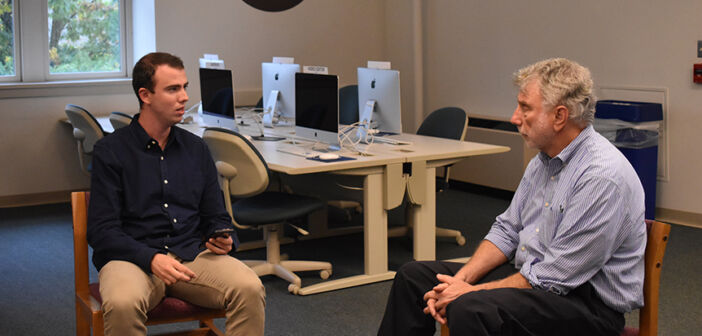Marty Baron, ’76, ’76G, ’14H, returned to Lehigh on Oct. 16 to accept The Excellence in Industry Award at the Leadership Recognition Dinner, as part of Founder’s Weekend. Baron is a former editor in chief of The Brown and White. He went on to work at The Miami Herald, The Los Angeles Times and The New York Times. He was the editor of The Boston Globe during the investigation into the Boston Catholic sexual abuse scandal. His work was depicted in the 2015 award-winning film, Spotlight and earned a Pulitzer Prize. Baron retired in February after working as the executive editor of The Washington Post for eight years. Baron spoke with The Brown and White about visiting Lehigh, his career and the future of journalism.
Q: How does it feel coming back to your alma mater once again and being recognized with The Excellence in Industry Award?
Marty Baron: It feels great. I don’t get back to campus all that often, but occasionally, every few years or something like that. My experience at Lehigh was a formative one for me and a big influence on my life, on my career. I feel that I have a debt to pay to this university. It’s always great to be back on campus and to connect with students and hear what their concerns are and see how the university is doing.
Q: What have you done with your time since you retired from The Washington Post in February?
MB: Mostly, I’ve been focused on writing a book, centered on my eight-plus years of experience at The Washington Post. So, the sale of The Post to Jeff Bezos, the transformation of The Post under Jeff Bezos, the conflict between The Post and Donald Trump as president, the conflict between Trump and Jeff Bezos, the issues that have arisen over the course of those eight-plus years, some of which were fairly evident over the last year. Fortunately, I have a long deadline, but there’s a lot to do.
Q: How did your time working at The Brown and White, your editorial roles at the biggest newspapers in the country, the Pulitzer prizes and the “Spotlight” investigation shape who you are today?
MB: I believe very strongly that people who hold power should be held accountable. The more powerful they are, the more accountable we should hold them because (of) the greater damage they can do and the greater capacity they have to suppress a story if they chose to do so and to suppress dissenting voices. Everywhere I’ve been, I focused on investigative reporting. I did that here at Lehigh, but I did that in my jobs over the course of my career. It’s become, I guess, what I’m most known for is having fostered that kind of work at The Boston Globe and at The Washington Post. I think that has been the signature aspect of my career.
Q: How should journalists respond to the criticism from certain groups that aim to discredit the role of the press?
MB: If somebody believes in the Constitution, they should read the First Amendment, which allows for a free press in this country. The reason we have a free press is exactly what James Madison, who is the primary author of the First Amendment, said, and that was the idea of freely examining public characters and measures. Public characters means government officials and other individuals who hold power. Measures mean the policies. That is our job! That is our primary job. So if you say you believe in the Constitution, you should believe in the role of the free press.
Q: What do you believe is the future of journalism?
MB: The field is changing dramatically. I think our core mission and principles remain the same. But the way journalism is being delivered is changing dramatically. Obviously, it’s going to be entirely digital. It will be on a mobile phone. That changes the nature of communication. So, in the same way that radio and television were different from newspapers, the internet is different from the law. That is a much more intimate form of communication because it’s in your pocket, on your phone. It’s something you consult almost all day long. Typically, it’s sitting at your bedside when you go to sleep at night. Making communication work well on a mobile device is using all the new tools that we have available to us today. Whether it’s text, video, audio, animation, annotation, interactive graphics, all of that is a direction of storytelling. So, I think storytelling is already changing very dramatically, and it’s going to change even more.
Q: What advice do you have for college students or anyone that is seeking a career in journalism?
MB: The great thing about journalism is that it allows us to continue our learning. It doesn’t stop in college. We end up going and talking to a lot of people about a lot of different subjects. We get to learn about those subjects. We get to learn about those people, and most importantly, we get to listen to people and hear what they have to say, then continually do independent research. My advice to journalists is to always be good learners and be good listeners. It’s a gift that we have in this profession. We should take that gift and use it to (our) best advantage.






Comment policy
Comments posted to The Brown and White website are reviewed by a moderator before being approved. Incendiary speech or harassing language, including comments targeted at individuals, may be deemed unacceptable and not published. Spam and other soliciting will also be declined.
The Brown and White also reserves the right to not publish entirely anonymous comments.